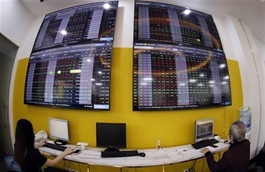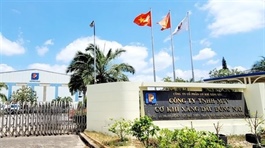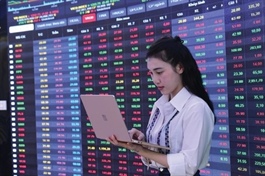Investors made aware of uneven recovery risks
Investors made aware of uneven recovery risks
Experts have highlighted a promising recovery in Vietnam’s stock market and general economy, despite ongoing geopolitical and inflationary risks.

At the Vietnam Wealth Advisors Summit 2024 co-hosted by VIR and Vietnam Wealth Advisors community last week, Dr. Can Van Luc, chief economist of BIDV Training School, noted the positive recovery in the stock market.
Nevertheless, he identified four major risks and challenges leading into next year: complex geopolitical conflicts, increased strategic competition among major powers, persistent high inflation and interest rates, and elevated public and private debt risks.
“The global economic slowdown will impact Vietnam’s economy, particularly the recovery of exports and consumption. If the US reduces interest rates soon, it could lead to lower consumer demand, directly affecting export orders from Vietnamese businesses,” he said.
However, Luc also noted that growth drivers are recovering, albeit unevenly.
“Macroeconomic foundations and risk management have improved, fiscal risks such as public debt, foreign debt, and government debt obligations remain at moderate levels, and there is still room for fiscal policy, which helps ease monetary policy pressure,” he said.
Additionally, inflation is under control, interest rates are decreasing, exchange rates and non-performing loans are manageable, and the stock market is performing well due to expectations of market upgrades and a recovering real estate sector.
Vietnam’s economy is rebounding, with retail sales revenue increasing by 8.7 per cent in the first five months of the year. The tourism sector, especially international tourism, has shown strong recovery, with a 3.9 per cent increase compared to the same period in 2019.
However, while consumer demand is recovering, spending remains low, Dr. Luc highlighted. The first four months of 2024 saw accommodation, catering, and travel service revenues reach a 14.5 per cent increase on-year.
Dr. Luc identified several challenges facing businesses, including legal issues, financial obligations, high input costs, and uneven order recovery leading to unsustainable growth and low profit margins.
“Private investment remains cautious, consumer growth is low, the corporate bond market is recovering slowly, and institutional frameworks for new sectors like the digital economy, green economy, and circular economy are slow to develop,” he noted. “Additionally, fear of making mistakes, fear of responsibility, and slow public service execution still persist.”
Meanwhile, one financial expert told VIR last week that amendments to the Real Estate Business Law and the Housing Law fundamentally revise social housing policies, expanding the scope of beneficiaries, simplifying implementation procedures, and introducing new regulations for social housing developers.
“Given the significant market capitalisation of the real estate sector, accounting for approximately 14 per cent of the VN-Index, positive trading in this sector due to these supportive factors could bolster the overall market in the coming month. The historical price-to-book valuation of sectors in the VN Index from 2018 to present shows that the real estate sector remains relatively attractive compared to other sectors,” he said.
At last week’s summit, Nguyen Minh Tuan, CEO of AFA Capital, forecasted that among the four financial asset classes, the investment channel for deposits has bottomed out, suggesting that yields on deposits will be higher moving forward.
He recommended that investors increase their proportion of deposits, not only to earn interest, but also to be prepared for market opportunities by using the funds to strengthen other asset classes. “Interest rates in the residential market have started to rise again following measures by the State Bank of Vietnam (SBV) to stabilise the exchange rate. I believe there will be many opportunities from now until the end of the year, and we need to be prepared with sufficient funds to increase other asset classes,” Tuan stated.
Regarding bonds, he highlighted that for investors, particularly individual investors, investing through public bond issues and open-end bond funds continues to yield good returns. In light of significant volatility in the gold and stock markets, he suggests increasing fixed-income assets from now until the second half of the year.
While access to privately issued bonds is restricted to professional securities investors verified by brokerage firms, investors can easily invest through open-end bond funds.
“For individual investors with limited time and market experience, investing through open-end funds provides the added benefit of experienced investors reviewing and assessing the bond holdings,” Tuan added.
He acknowledged the ongoing risks in the bond market, particularly regarding maturity pressure. However, he advised investors to consider bonds issued by banks, which have issued large volumes since the end of 2023 through public offerings accessible to all investors.
In its base scenario, KB Securities Vietnam (KBSV) anticipates that the VN-Index will require more time to move sideways around its peak in June, with stock groups showing varied performances before making more significant moves as the Q2 business outlook becomes clearer.
“Factors that could influence market sentiment in June include corporate earnings reports for June and Q2,” KBSV noted. “Changes in net buying/selling values by foreign investors will also be noteworthy, as a slowdown in foreign selling is positive for the market.” Additionally, the market needs to monitor the USD/VND exchange rate and actions by the SBV.
However, investors should be aware of three risks that could impact the base scenario. “Firstly, geopolitical conflict risks are escalating. Tensions in the Middle East and the potential for these to spread globally pose a threat to global stability, affecting commodity prices and supply chains,” KBSV stated.
“Secondly, if foreign investors continue their net selling trend, it could hinder the overall index recovery. Thirdly, the strengthening of the USD continues to pressure exchange rates and influence SBV policies.”



























